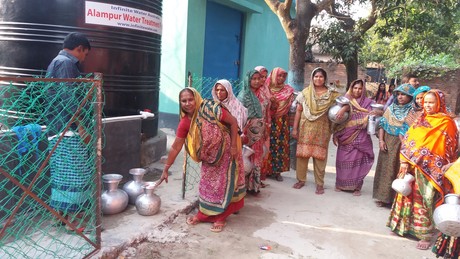Australian tech decontaminating groundwater in Bangladesh

Australian company Infinite Water has partnered with the Bangladesh Government on the commissioning of a water treatment plant (WTP) to decontaminate groundwater in Bangladesh’s Alampur Village. Infinite Water used its innovative HYDROXON technology to design and build a custom WTP to remove high levels of naturally occurring arsenic and manganese, delivering 8000 L a day of safe, clean drinking water.
Arsenic is a significant contaminant in groundwater wells in Bangladesh, affecting 70% of the country with up to 77 million people at risk. High levels of arsenic in drinking water can cause cancer and skin lesions, and impair intellectual development. Around 1 in 12 of the 3900 residents of Alampur Village fall ill and 25 have died over the past five years because of exposure to arsenic.
The core technology utilised in the HYDROXON process is based on non-ozone-based catalytic advanced oxidation (CAO), where hydroxyl radicals are produced via a catalytic process. These hydroxyl radicals are highly reactive and the strongest oxidants that can be applied in water, so they can virtually oxidise any compound present in the water matrix.
HYDROXON is able to decontaminate and disinfect water while using limited amounts of energy and chemicals, as it is based on the oxidation of biological processes within the human body. Furthermore, initial testing shows the pilot WTP is delivering drinking water that exceeds WHO standards to meet the needs of the Alampur Village. The plant has successfully treated groundwater with arsenic levels of 178 micrograms per litre (µg/L), reducing them to just 4 µg/L. The WHO standard is 10 µg/L.
The Bangladesh Government’s Department of Public Health Engineering (DPHE), which has responsibility for water and sanitation, has tested several other water treatment technologies but none were found to match the HYDROXON process’s ability to deliver low operational and maintenance costs, low power consumption and more than 95% water recovery. The DPHE has also indicated an interest in assessing the HYDROXON process for industrial sector wastewater applications.
“We are working closely with Infinite Water to treat contaminated groundwater to provide safe, clean drinking water in rural Bangladesh, especially in the south-western areas,” said DPHE Superintending Engineer Saifur Rahman. “The early results of catalytic oxidation-based water treatment are very positive and we feel that there is a wide range of future applications for this technology in our country.”
Infinite Water has started the process of identifying NGO partner organisations, such as the World Bank, the Asian Development Bank, the WHO and aid agencies like Oxfam, to support the rollout of HYDROXON WTPs across Bangladesh and other developing countries in need of help. A full DPHE report, which is expected to validate the success of the pilot WTP, is due in February 2019 and should be the catalyst for an expansion of the program.
“Our ability to provide clean, safe water reliably and at low cost is changing lives,” said David Marquard, Director Strategy & Special Projects at Infinite Water. “I could see this in the heartfelt thankyou that Jakea Sultana, an Alampur Village Year 10 student, gave me in a video call earlier this week. We are excited to expand the program across Bangladesh and into other regional countries.”
Please follow us and share on Twitter and Facebook. You can also subscribe for FREE to our weekly newsletter and bimonthly magazine.
Chip makes pH measurements easier
Researchers have developed a new technology that makes pH measurements more robust, simple and...
Adsorbents capture short-chain PFAS in water
A new method paves the way to help remove the most difficult-to-capture variants of...
Floating desalination solution to combat water scarcity
Veolia and SBM Offshore plan to develop and deploy freshwater floating production units to...








